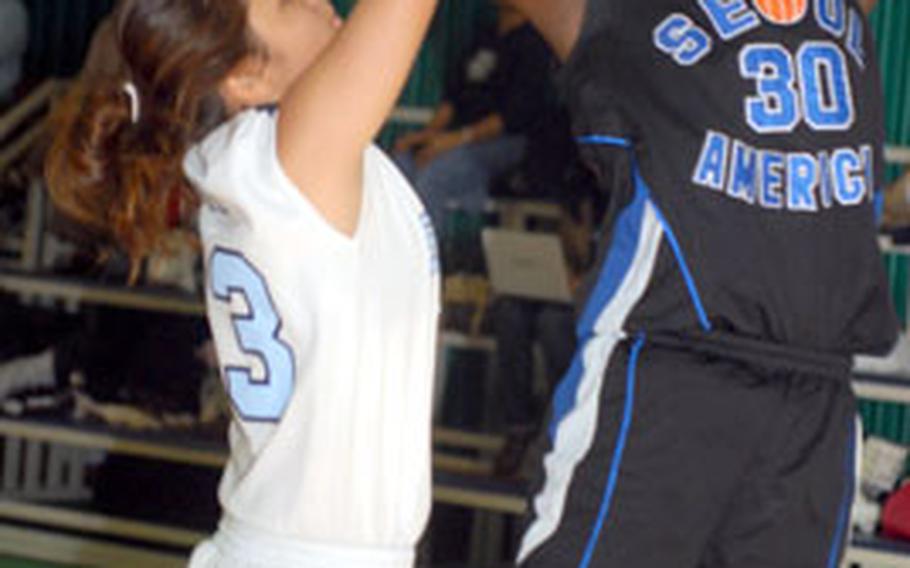
Seoul American’s Devanee Taylor (30) shoots over Sara Ennis of St. Paul Christian of Guam on Dec. 21 at Yongsan International School of Seoul. The Falcons, who finished third in last year’s Far East Class AA tournament, hope outgoing Seoul American coach Charlotte Hicks will exit a winner — but they’ll have to do it on the road, at Kadena. (Dave Ornauer / S&S)
If she’s going to exit a champion in her final Far East High School Girls Class AA Basketball Tournament, Seoul American coach Charlotte Hicks must buck a trend.
Since 1986, Class AA tournament host teams have reached the championship game 16 times. Of those, 11 came away victorious, including the past six.
“I’m all too aware of that,” said Hicks, who announced at the start of this season that it would be her last.
Her Falcons travel to Okinawa to try to unseat defending champion Kadena on the Panthers’ home court. The tournament runs six days, as does the boys Class AA tournament at Seoul American.
Hicks would love nothing more than to cap her Falcons’ incomparable run of nine third-place finishes, two fourths and titles in 2005 and ’06 since 1995. They’ve also won 15 straight Korean-American Interscholastic Activities Conference titles.
But she’d rather do it at home, Hicks said. The difference between having to play road warriors and enjoy home cooking is “night and day,” she insists.
“When we’re at home, we don’t have to get up early to catch a flight, plan billeting and food, do the paperwork prior to leaving,” she said.
Then there’s pressure from teachers and school administration to ensure students do homework and obey the tournament’s code of conduct.
“It’s non-stop activity, like being on-call 24 hours a day,” Hicks said. “When you’re at home, you just tell the kids, ‘OK, we play at 2, be here at 1, wear our home jerseys.’ It’s a big difference.”
“It’s so tough, so different,” said coach Jon Fick of defending Class AA boys champion Kubasaki. “It’s a different country. It’s freezing up there [in Seoul]. Your eating habits change. By Thursday or Friday, your body is rebelling.”
“You can’t put a price tag on it, emphasize how important” being at home is, said Ken Hudson, who’s coached Kadena’s girls to two Class AA titles, each on Okinawa.
His Panthers handed Seoul American its only loss of last season 57-43 in the semifinals before a deafening crowd at the Panther Pit.
Home fans come out in the droves to cheer on their favorites, particularly on seminar days when administration will sometimes let students out to attend games.
At schools like Seoul American, Kubasaki and Kadena, which have won a combined 36 Class AA titles, banners line the ceilings like ducks in a shooting gallery, which can be as intimidating as fans, Hudson said.
“You’ll always fight harder on your home court,” Hudson said. “That’s always an advantage. That’s very clear.”
Such, though, are the spoils of being a tournament host.
“Any time you have to play them on their home court, they should get the fanfare,” Fick said. “Seoul American’s the front-runner and it’s at their place.”
Since 1982, host teams have reached 18 Class AA boys finals, with 11 of them winning — but none since 2005.
Fick’s Dragons pulled off back-to-back upsets, 76-75 in an overtime semifinal over favored Zama American and 75-71 over host Seoul American in the title game, again before throngs of vocal Falcons fans.
How does a road team overcome all that?
Physical and mental conditioning, focus and “a lot of luck” come into play, Fick said.
“You have to get through the early part of the week without an injury or sickness,” said Fick, who caught a cold at mid-week last year. “If you’re still standing on Saturday, you have a shot at winning it all.”